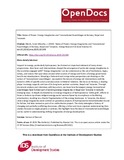| dc.contributor.author | Movik, Synne | |
| dc.contributor.author | Allouche, Jeremy | |
| dc.coverage.spatial | Norway | en |
| dc.coverage.spatial | Nepal | en |
| dc.coverage.spatial | Tanzania | en |
| dc.date.accessioned | 2020-05-05T08:22:57Z | |
| dc.date.available | 2020-05-05T08:22:57Z | |
| dc.date.issued | 2020-09 | |
| dc.identifier.citation | Movik, S and Allouche, J. (2020) 'States of Power: Energy Imaginaries and Transnational Assemblages in Norway, Nepal and Tanzania', Energy Research & Social Science 67, doi:10.1016/j.erss.2020.101548 | en |
| dc.identifier.uri | https://opendocs.ids.ac.uk/opendocs/handle/20.500.12413/15279 | |
| dc.description.abstract | Support to energy, particularly hydropower, has formed an important element of many donor programmes. How have such interventions shaped the emergence of particular energy imaginaries in the countries engaged with? ‘Energy imaginaries’ can be understood as the set of institutions, logics, values, and visions that spur ideas around what sources of energy and forms of energy governance best foster development. Adopting a historical and comparative perspective and drawing on the notion of ‘transnational assemblages’, we explore the nature of energy aid interventions and the dynamic shifts of specific actors and discourses in bilateral relations. We focus on Norway, a leading player in energy support, and two of its long-term partner countries, Nepal and Tanzania. Through document analysis and interviews with key actors, we trace how Norwegian energy transnational assemblages have formed part of evolving energy imaginaries in Nepal and Tanzania in radically diverging ways. In Nepal, dominated by an energy imaginary of hydropower as ‘white gold’, efforts to foster a bottom-up-driven indigent energy sector were eclipsed by an emphasis on facilitating privatisation, resulting in a chaotic fragmentation of the energy landscape. In Tanzania, the donor-state energy imaginaries were centred on grandiose projects of hydropowered industrialisation bound for failure, but later revived as part of an authoritarian project. The study untangles a history of changing and partially conflicting discourses, offering a richer and more nuanced understanding than studies focused on single projects or policies. We highlight how the idea of transnational assemblages can be useful in understanding shifting imaginaries of energy development. | en |
| dc.language.iso | en | en |
| dc.publisher | Elsevier | en |
| dc.relation.ispartofseries | Energy Research & Social Science; | |
| dc.rights.uri | http://creativecommons.org/licenses/by/4.0/ | en |
| dc.subject | Politics and Power | en |
| dc.title | States of Power: Energy Imaginaries and Transnational Assemblages in Norway, Nepal and Tanzania | en |
| dc.type | Article | en |
| dc.rights.holder | © 2020 The Author(s). Published by Elsevier Ltd. | en |
| dc.identifier.externaluri | https://www.sciencedirect.com/science/article/pii/S2214629620301249 | en |
| dc.identifier.team | Resource Politics | en |
| dc.identifier.doi | 10.1016/j.erss.2020.101548 | |
| dcterms.dateAccepted | 2020-04-01 | |
| rioxxterms.funder | Default funder | en |
| rioxxterms.identifier.project | Default project | en |
| rioxxterms.version | NA | en |
| rioxxterms.versionofrecord | 10.1016/j.erss.2020.101548 | en |
| rioxxterms.funder.project | 9ce4e4dc-26e9-4d78-96e9-15e4dcac0642 | en |


